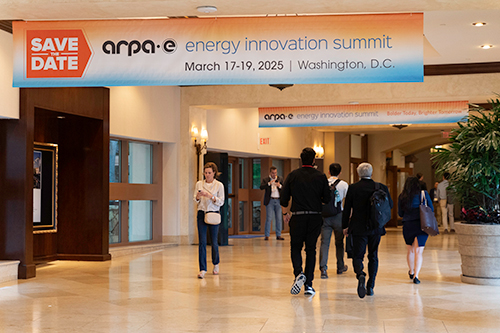In May, researchers developing innovative clean-technology solutions conducted customer discovery interviews at the 2024 ARPA-E Energy Innovation Summit in Dallas, Texas, as members of a ‘hybrid’ National Science Foundation (NSF) I-Corps regional course hosted by the Interior Northeast I-Corps Hub (IN I-Corps). NSF created the I-Corps program to help researchers extend their focus beyond the lab and accelerate the economic and societal benefits of innovative technologies.
During the course, ten teams of researchers learned how to evaluate their technology innovation’s market potential by interviewing potential customers.
“I think it is important to speak to potential customers to validate the need for your product or service, learn what value you are providing to end-customers, and to uncover any opportunities you may not have considered,” said course participant Mark Bodner, who developed a zero-emission waste incinerator. “We learned we needed to look further upstream to identify our real customer.”
The following teams successfully completed the 2024 ARPA-E course:
- Elemental Genesis Technologies (Terence Musho – West Virginia University) is developing technology to recover and recycle copper and platinum-based metals from electronic waste.
- Arculus Solutions (Gianluca Roscioli) is facilitating the transition from natural gas by retrofitting pipes with a hydrogen-barrier coating that will prevent hydrogen gas from embrittling and destroying the existing infrastructure.
- Terra Watts (Kaitlyn Suarez – UMass Amherst) is developing a subsurface power transmission technology for data communications that can utilize renewable energy sources.
- Team Nguyen (Allen Nguyen – Dartmouth College) is developing a power electronic replacement for low-frequency transformers, found in many household applications, to significantly reduce energy loss.
- Zero Emissions IRG-WTE (David Waage and Mark Bodner – SUNY Cobleskill) is converting trash into liquid Carbon Dioxide and highly densified ash using inclined rotary gasification, reducing the volume of waste by more than 95 percent.
- ChipAdd (Harish Kumar Lattupalli and Md Asif Iqbal – Binghamton University) is developing an energy-efficient, low-cost, and reliable cooling technology for semiconductors.
- Serida (Eve Quin and Henry Williams – Cornell University) is developing software to design solar energy facilities co-located with agriculture, a concept known as agrivoltaics.
- Topological Electric (Ambrine Douhane, Arttitaya Boonkird and Cynthia Liao – MIT) aims to build energy harvesting device prototypes with environmentally friendly materials.
- Energy GPT (Cong Chen and Ahmed Saleh Alahmed – Cornell University) is developing a resource aggregation system for distributed energy resources (DERs) such as roof-top solar panels and electric vehicles to optimize energy management and stabilize prices for buyers.
- ICoN Energy (Firehiwot Gurara and Dheeraj Etta – Cornell University) is developing a bi-directional power converter that is much smaller than comparable technologies, making it ideal for onboard electric vehicle chargers.
“A surprising and enlightening takeaway was our encounter with a startup that has a similar business model but operates in a completely different industry,” said course participant Eve Qian. “This unexpected connection highlighted the similarities in our business models and underscored the importance of consulting services in the early stages of a nascent industry.”
Following the trip, the teams had a week to do more interviews, then reconvened virtually to present their findings and receive additional coaching from their instructors, Olga Petrova (Director, Binghamton University Entrepreneurship & Innovation), and Erienne Olesh (Executive Director of Student and Faculty Innovation, West Virginia University).
They also received information about more local resources, including the NSF National I-Corps Teams program, a seven-week entrepreneurial training course for STEM researchers that awards participants up to $50,000 to conduct over 100 customer discovery interviews. Participating in the I-Corps Teams program gives startups an advantage in receiving SBIR/STTR seed funding that provides small businesses with non-dilutive funding offered by 13 federal agencies. Completing a Regional I-Corps course is required for the Entrepreneurial Lead on an I-Corps Teams application.
Apply now for an upcoming regional course hosted by IN I-Corps.


